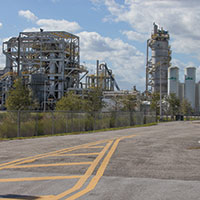 New attempts to start up INEOS biofuel plant fail
New attempts to start up INEOS biofuel plant fail
STORY
Several new attempts have been made since the beginning of this month to start up the critical boiler at the INEOS biofuel plant just west of Vero Beach, but all have failed, according to an informed source.
The boiler, which “boils” biomass from yard waste and other organic materials to supposedly convert it into ethanol fuel, was first started up again on Feb. 6, but it was down again by mid-morning of the following day, the source said.
“Over the next several days, many more attempts were made to run the boiler and turbine, resulting in failure of both systems due to many steam leaks and high turbine vibration,” the source added.
A spokesperson at INEOS’s U.S. headquarters in Chicago said the firm doesn’t disclose any details about the plant’s operations. Asked specifically if he could confirm if there had been issues with an attempted start-up, he simply repeated: “We do not disclose our operations.”
The attempts to restart the operation occurred after word came down from the British owner of the biofuel plant owner on Jan. 22 that heads would roll if the operation wasn’t producing by June. At the same time, orders were given to effect a start-up by the end of this month.
To solve the boiler and turbine problems, a new maintenance contractor is now on board and is currently addressing these issues, and the sources said the plant still has a target date of the end of this month for a full startup if the support systems get repaired – which appears to be a big if.
“Testing and a dry run of the gasifier (a crucial element of the biofuel operation) this past week have been positive,” sources said.
After a flurry of questions and safety concerns surfaced last month, the Florida Department of Environmental Protection sent an inspector to the plant. However, since the biofuel (ethanol) production operation was shut down, the section of the FDEP report relating to the biogas production operation remained blank.
The FDEP plans to return sometime in March, when the plant will supposedly be back in full operation.
Questions about actual gallons of ethanol produced since the plant opened in 2013 have had no official response, the company continuing to cite confidentiality concerns. Unofficially, insiders say that production has been virtually nil.
The FDEP is hoping for a determination from its General Counsel soon as to whether actual production information can finally – or ever – be disclosed.
In mid-2013, the Department of Energy, which provided a $50 million grant “to design, construct, commission and operate the Indian River BioEnergy Center,” published a news story on its website with a headline announcing, “Florida Project Produces Nation’s First Cellulosic Ethanol at Commercial-Scale. The Energy Department today (July 31, 2013) recognized the nation’s first commercial-scale cellulosic ethanol production at INEOS Bio’s Indian River BioEnergy Center in Vero Beach, Florida.”
Although the definition of “commercial-scale cellulosic ethanol production” remains elusive, it seems that early reports of production may have jumped the gun. In response to queries, an INEOS spokesperson stated, “Yes, we had the commercial-scale fermenter running at that time (July 2013), but not at full capacity due to the impurities in the syngas.”
As to what, if any, requirements the Department of Energy has placed upon INEOS to go along with its $50 million grant, a DOE spokesperson promised an answer at a later date.
The crux of the high-tech operation’s problems, in addition to equipment issues, is hydrogen cyanide, produced during the conversion of the feedstock – yard waste and other plant material – and found to be lethal to the microorganisms necessary in the fermentation process.








